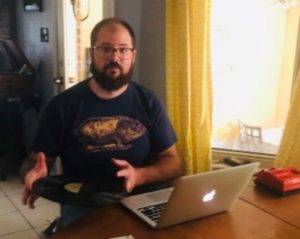Sep 2020
V. Von Generation zu Generation: Über Nico: The Diva and the Fantasy
Über Nico:
The Diva and the Fantasy
Justin Johnson, Chesapeake, Virginia
 Nico Nico
|
Since the first of you and me asleep
in a Nibelungen land
Titanic curses trap me in
A banishment of stay
Symbols vanish from my senses
Stem and stave the view appears
[…] Since the first of you and me here and there
We lose the direction everywhere
Shrieking city sun shiver in my veins
In flames I run
In flames I run
Waiting for the sign to come
[…] Nibelungen
Nibelungen
Nibelungen land.
(Excerpts of Nibelungen from 1991’s re-release of Marble Index)
In my opinion one does not always instinctually know how to discern, let alone appreciate the new music that one hears. A track may not be likable upon the first listen. Sometimes, first impressions are validated with successive takes, though occasionally one may find one’s opinions change, sometimes all at once, other times much slower, track by track. Nico is one such artist, whose music is slow to blossom. Her compositions, particularly from 1968s Marble Index and 1970s Desert Shore, are alien, ethereal, anachronistic, and pensive. They are discordant and typically in a minor key. In general, her music is everything antithetical to pop-music. Some argue her aesthetic was a rejection of fame and of the popular emphasis on her “Nordic” beauty.
Others have interpreted this, as well as her choice to wear all black, as an attempt to control the artistic direction of her career. Despite these criticisms, I don’t think it is possible to deny that her music is uniquely captivating. At the very least, it could be argued that the gothic and bohemian singer existed as a set of contradictions: the Old World versus the New World, the past versus the present, urban versus rural, the beautiful versus the strange. The above sample of lyrics illustrates some of these contradictions, in particular the old world versus new/past and modern and the urban versus nature. The reference to the mythical Nibelungenland places an emphasis on the past, fantasy, and perhaps by extension on the psychological. Similar to her lyrics, Nico’s story initially seems ambiguous and difficult to understand. Prompting the question: Who was Nico?
Nico, born in 1938 in Cologne, Germany as Christa Päffgen possessed a certain sensitivity, and perhaps romanticized view of the past, and a strong need for fantasy that permeated her art. Yet she was also a child of the modern age, awash in the avant-garde art scenes of her day in Paris and New York. Nico is perhaps the musical equivalent of Anita Berber, the infamous dancer from the Weimar era known for dancing bombastically in the nude and having salacious public affairs. In very similar ways, Nico had a very ambitious and public persona. Her music was a means through which she could express herself, indeed lay herself bare for all to see. Tracks such as “Ari’s Song” or “Le Petit Chevalier” exemplify how it feels to be a mother separated from her child. “Mütterlein” from the album Desertshore, one of the few songs she recorded in German , highlights her troubled addiction to heroin. The listener can sense her “Sehnsucht und Einsamkeit,” and hear how her “Herzeleid” turns to “Wonne” as she attempts to “seize the prevailing flood” (“In Wonne wandelt dein / Und greift in die siegende Flut hinein”). While she could be very personal in her music, she could also be very cryptic. Tracks such as “Frozen Warnings” and “No one is there” seemingly come out of left field with no specific reference point. Instead, they blend elements of the medieval and the modern, arguably presenting little snapshots of life, though one cannot be certain. On the one hand, they both involve characters pulled out of a morality play, such as a friar (“Frozen Warnings”) or a demon (“No one is there”). Additionally, the droning violin of “Frozen Warning” evokes a scene of an ancient wilderness.
Contrarily, the lyrics paint a more modern image. This image is brought into focus with the following lines:
Over railroad station tracks
Faintly flickers a modest cry
From without a thousand cycles
A thousand cycles to come
A thousand times to win
A thousand ways to run the world
In a similar reply
“Over railroad station tracks “ sets the scene – perhaps in the crowded New York City Subway. In the scene, we hear rather than see the action: A “modest cry,” sounding more like a primal scream, is bleeding into our consciousness like the flickering windows of a passing train. The “thousand cycles” evoke the revolutions of the train wheels and all together the imagery adds up to the repetitious operations in a modern train station. While I cannot be certain of her inspiration, the repetitious instrumentation pulls you in, allowing the listener to lose him or herself in the lyrics, and their imagination.
The song “No one is there” also has this dualistic quality that leaves the listener distorted and dislocated. The result is music that blurs time and space, carrying the listener into a realm of fantasy and of the psychological.
Driven by her harmonium, her sound is somber, discordant, though, to some degree lush. The oft dizzying progressions drone and seesaw repetitiously, her German-accented cantillations evoking a medieval atmosphere. Due to the unusually stark character, the listener experiences these tracks consciously, and is forced out of his/her comfort zone and into their head. This is most evident in her tracks “Lawns of Dawn” and “Frozen Warnings,” both from The Marble Index. Alone, the compositions seem little more than half-conceived musings. Combined, however, with her famously vague and oft chanted lyrics and in addition to backing instrumentation from fellow Velvet Underground alum John Cale, she weaves hauntingly intimate and inviting stories. These little narratives frequently seem very personal and autobiographic, even perhaps a sort of internal monologue with herself. Through this whirl of fantastic and alien sounds, one finds oneself transported: to another place, time, or reality. As Nico works through her demons, the listener is simultaneously invited to do the same. These ethereal qualities are what attracts me to Nico. In this way, her music is a type of heroin for me.
 Justin is looking for the record player. (It is right behind him) Justin is looking for the record player. (It is right behind him) |
I know that Nico’s music would typically not be considered uplifting. However, I find her to be an inspiring individual, who lived life and made music on her own terms. Her dark, personal musing are intimate and transporting, despite being non-traditional. Listening to “Frozen Warnings,” for instance, I am transported to a nebulous, rustic landscape similar to Northern Europe. In “Afraid” from Desertshore I delve deep into her (and vicariously into my own) inner, melancholic world. Or perhaps in “Mütterlein,” I can escape into a realm of secret desires and perverse pleasures. Despite of creating the impression of sounding depressing and discordant, I guarantee she is a gem worth discovering for anyone willing to take “a walk on the wild side.”
